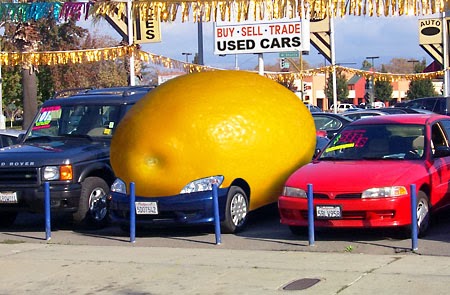 Does it seem like your car is always in for repairs more than it is in the driveway? Or does it come to a point when it needs the same repairs over and over? If such is the case, then lemon law might be applicable to you. In simple terms, lemon law is meant to provide you with legal leverage to seek a refund for the purchase price of your vehicle, and sometimes, reimbursement for the troubles. This law is intended to give consumers a solution when the manufacturer has been given enough opportunities to fix the problem but failed to satisfactorily done so. This also give consumers a solution to problems that may have impaired the normal operations or have affected the value, safety, and the intended use of the vehicle. However, the law is not intended to give remedies for complaints about the fundamental designs of the vehicle, and other non-critical issues such as rattles and squeaks, fading paint, and minor vibrations.
Does it seem like your car is always in for repairs more than it is in the driveway? Or does it come to a point when it needs the same repairs over and over? If such is the case, then lemon law might be applicable to you. In simple terms, lemon law is meant to provide you with legal leverage to seek a refund for the purchase price of your vehicle, and sometimes, reimbursement for the troubles. This law is intended to give consumers a solution when the manufacturer has been given enough opportunities to fix the problem but failed to satisfactorily done so. This also give consumers a solution to problems that may have impaired the normal operations or have affected the value, safety, and the intended use of the vehicle. However, the law is not intended to give remedies for complaints about the fundamental designs of the vehicle, and other non-critical issues such as rattles and squeaks, fading paint, and minor vibrations.
Lemon VS. Rotten Tomato
What this actually means is that, when you have a vehicle that breaks down or fails in some ways, in different ways every time, then you are not going to be covered under lemon law. The appalling truth in this case is that, you don't have legal grounds to be reimbursed, you just have an unreliable, poorly-designed and trouble-prone car, not the one that is defective.
From a legal point of view, the key difference is that a lemon car is seen as a defective product and thus covered under applicable statutes and special lemon laws in a given state. Below are some of the tips how to tell if a car might be covered under the lemon law in a state, what you should do along the way, and how to take the necessary actions.
- The same repair over and over
The vehicle need to have an issue that is ongoing, or has been occurring repeatedly. And the manufacturer should be given several chances to repair it. Lemon law often applies after when the manufacturer has tried to fix the problem for three or four different times, but failed to provide a lasting solution.
- Nearly a new vehicle (to you)
Lemon law applies during the first year or two and the first 12, 000 or 24, 000 miles of vehicle ownership, this basically depends on the state. The identification of the problem and other repair attempts should be made during such period. When the problem occurred during the first year of ownership but there were no subsequent repairs made until the later years, then the vehicle is not likely to be covered under the law.
- You own rather than lease
The law does not often apply to lease cars, as the bank or the manufacturer becomes the actual owner. This usually applies to the original buyer.
- Keep all documents
These are the documents of every repair done during the warranty period. Also, keep all your receipts. Consumer law will not be applicable unless you have records as proof of all the repairs done. In addition, make sure that the dealership accurately documents the problem and how long the car was in for repair. Moreover, get a repair invoice for repairs covered by technical service bulletins.

When these issues arise, it pays to have the advice of an attorney who is highly familiar with the give state's lemon law, as this would increase your chances of getting the refund.





 No matter how keen you are into buying your vehicle, defective ones are hard to point out. Some manufacturers don't even know that they are producing defective vehicles. There are a lot of reasons why a vehicle suddenly become inoperable and useless. It may disappoint you especially if you are running out of time for a party or important occasion. Defective vehicles can harm a person, damage another party and be a cause of accidents. If you are the owner of this vehicle, you would probably go red with anger. But, worries aside, you have to think ways how you can get properly compensated from such mishap. That's
No matter how keen you are into buying your vehicle, defective ones are hard to point out. Some manufacturers don't even know that they are producing defective vehicles. There are a lot of reasons why a vehicle suddenly become inoperable and useless. It may disappoint you especially if you are running out of time for a party or important occasion. Defective vehicles can harm a person, damage another party and be a cause of accidents. If you are the owner of this vehicle, you would probably go red with anger. But, worries aside, you have to think ways how you can get properly compensated from such mishap. That's 





